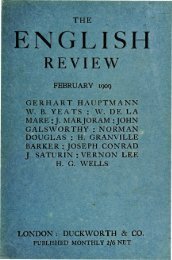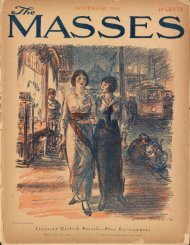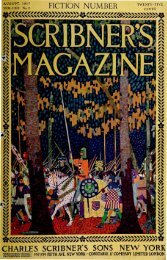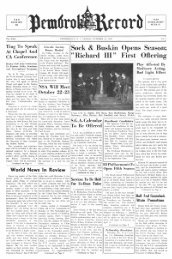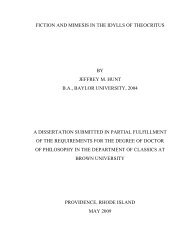92 A Theatrical Boarding-House in Sydneyhearing it. I was not only a good listener•—I was an eager, ardent one. The olderactors at Miss Leaney's found me mostappreciative of their tales of formersuccesses—"when the house rose" atthem—"when the theatre rocked withapplause." To the younger ones and theirdreams of fame, I listened with awe andrespect. I was a willing and conscientiousreader of press notices, and so long as astory was well told, I did not care howmany times I heard it. I had alwaysfrom earliest childhood taken a great interestin the theatre, and these peoplewere not ordinary folks to me—they hadabout them the glamour of the footlights.To return the compliment, they wereall more or less interested in me, the firstAmerican, strange to say, that any ofthem had met; and Austin was a constantsource of entertainment. Theywere quite frank in noting our peculiaritiesof speech and manner—not criticallyor scornfully, but as we would discuss theWild Man of Borneo in the circus."You most scared me to death," Austinexclaimed one morning at a turn inthe stairs when he ran into an actor comingup to breakfast. The man stoppedabruptly. "Say that again," he said.Austin repeated his remark. "Strange,"said the man, "I can't understand a wordof your lingo.""Mush" for porridge amused themvery much, and when I said I had leftmy room "every which way," and hadcrossed the street "catty-corner," andsaid "coal-oil," "elevator," "drug-store,""dry-goods store," and "conductor," forkerosene, lift, pharmacy, drapers, andguard, besides many other expressionsthat were natural to me, I realized thatI was speaking a foreign language tothem.The only help Miss Leaney had in runningthe house was a very pretty youngersister named Flossie, who never did anythingthat I could see but bang on thepiano and cause an occasional sensationby fainting from tight lacing. There wasa cook in the dark lower premises whooccasionally broke loose like a wild animaland had to be overpowered by the police—and Annie. Annie was a little maidof all work, exactly like the "slavey" inpopular English comedies. She calledMr. Osbourne "Mr. Hospin"; she saidthat a neighbor was going to "Owbart todie" (to Hobart to-day), and when Austinasked the name of a little nut she toldhim it was a "high-corn." She wasyoung, and might have been pretty if shehadn't always a smut on her face and herhair screwed up in a tight wad on the topof her head. She was so " true to form,"that she wore huge feathers in her Sundayhat. With the kitchen on the first floorback, and the dining-room on the secondfloor front—up a very long flight of stairs—Annie would have had enough to dowaiting on the table, but she swept,brought up breakfast-trays, ran errands,carried heavy loads of coal, and yet foundtime to answer brightly and cheerfullythe constant calls for "Annee" over thebannisters.Mrs. Magee was the first friend I madeat Miss Leaney's. Though she was ayoung woman, she was the oldest boarder,and she made me a stately little call as"doyenne." She was the adoring wife ofa big handsome Irishman she called"Hammy," who was manager of theCriterion Theatre. They were both fromBelfast, and returned there shortly afterwe left Miss Leaney's, on "Hammy's"falling heir to a fortune. It pleased mew r hen I heard that they gave a granddinner on the eve of their departure forIreland to all the guests at Miss Leaney's,and presented that dear soul with a diamondbrooch.I have been grateful all my life sinceto the Magees for their kindness to me—for it was Hammy who gave me a passto the Criterion Theatre.It did not have to be renewed withevery performance. I was introduced toMr. Grant at the box-office, and to theman who took the tickets. Only firstnights, Saturdays, and holidays werebarred—on all other occasions I was freeto walk in, provided I wore eveningdress.To the good Magees I owe some ofthe happiest hours I have ever spent ina theatre; I grew to know the actors atthe Criterion almost intimately; I learnedtheir peculiarities, their mannerisms, andthe very tones of their voices, so that tothis day their names thrill me as those ofold and loved friends: George Titheridge,
A Theatrical Boarding-House in Sydney 93who heads my list as the greatest actorI have ever seen; Dion Boucicault, whoseevery movement was a joy, the enchantingMrs. Brough—George Anson, Pattie<strong>Brown</strong>, Emma Romer, Jenny Watt-Tanner, Cecil Ward—all and every oneof that incomparable stock company!There were no great names amongMiss Leaney's boarders. Those whocame to her were of the rank and file ofthe profession, hard-working, ambitious,deeply interested in the theatre and invery little else. I can't remember thatwe ever talked of current events; nobooks were read, except perhaps a trashynovel to pass the time on a rainy Sunday.The stage, the actors, and the plays werediscussed morning, noon, and night.The only drone in that busy hive wasMiss Tracy, who had the big back roomon the top floor. She had once been aleader of the chorus, but had to retire asshe grew too stout for the part. She wasa very tall woman, fair as a Swede, withstraw-colored hair and an enormous bust.She had never had a speaking part on thestage, but was far more theatrical in hergestures and allusions than the real actresses.She had a way of touching herforehead with the tips of her fingers,rolling her eyes, and waving her hand inthe air when she said "I remember" thatwas tremendously effective.Miss Tracy evidently had a privateincome, for she dressed well, did no work,and had plenty of time which she spentin making calls. There were always womentrailing up the two long flights of stairsto see Miss Tracy.Her room was a large, light corner one.The first things that caught your eye onentering were the photographs. Theywere tacked all over the walls close togetherin a mass that reached the ceiling.They were mostly autographed picturesof theatrical friends, but many were ofherself in the great days of her youth andbeauty. She pointed them out withpride. They showed a tall, buxom girlin tights, a satin bodice laced into painfulproportions, trunks, and very high-heeledboots, a fashion that hideously distortedthe human frame, but Miss Tracy lookedat the photographs fondly, tapped herforehead, rolled her eyes, and "remembered,ah me!" some more.She told me the story of her life severaltimes, with tremendous dramatic intensityand great variety. In one versionshe had been very wealthy, the spoiled,petted wife of an indulgent husband.She had much "carriage company" (itwas the first time I had heard the expressionand it stuck in my mind), but a darkcloud was approaching. Her dearestfriend, a woman of rank and fashion,crept into her life like a snake in thegrass, inveigled her husband, and elopedwith him. Miss Tracy, with agonizedtappings of the forehead and waving ofwhite fingers, recalled, ah me! that terriblenight when the truth burst uponher. Throwing her ermine cloak abouther shoulders, she drove in her carriageand pair to the theatre, where she fellfainting in her opera-box !Teddy Royce and his wife (the realfounders of Miss Leaney's theatricalboarding-house) had met in their youthmany years before in London, as Columbineand Harlequin in a Christmas pantomime.They had fallen in love witheach other dancing their fairy dances tolovely music, were married at the end ofthe run, and I saw in real life a couplewho "lived happy ever after." They hadnine children, all living, the older boyssupporting themselves, the girls married,and there were two of the youngest stillat school in England. Only one cloudhad crossed their blue horizon—a terriblemisfortune—but it had only served todraw them closer together. A few yearsbefore they came to Australia, Teddy,who was what he called "an operaticdancer," had missed his step in leapingthrough a trap-door. He fell, was pickedup insensible, and lay on his back paralyzedfor a year. He could not move orspeak, though he could see and hear allthat went on about him. It was the passionate,unwearying devotion of his wifethat saved him. She understood thequiver of an eyelash, and never lost hopeor allowed him to despair. She riggedup a tray in front of him, so arranged thathe could watch her put picture-puzzlestogether. She chatted to him gayly,telling all the pleasant gossip of thetheatre—sometimes, as she confessed tohim afterward, with a catch at her heartfor fear he did not understand. And in
- Page 1 and 2:
JULYMR. SCHWAB'S VIEWS ONGOVERNMENT
- Page 3 and 4:
SCRIBNER'SMAGAZINEPUBLISHED MONTHLY
- Page 5 and 6:
CONTENTSSCRIBNER'SMAGAZINEVOLUME LX
- Page 7 and 8:
CONTENTSvPAGEFOR BETTER ILLUSTRATIO
- Page 9 and 10:
CONTENTSviiREMAKING OF FRANCE, THE
- Page 11 and 12:
Vol. LXVI. No. 1 J U L Y 1919SCRIBN
- Page 13 and 14:
Dance any time —the Victrola is a
- Page 15 and 16:
Xeg. U. S.Patent Otf.SCRIBNER'SFift
- Page 17 and 18:
Reg. U. S.Patent Ujff.SCRIBNER'SFif
- Page 19 and 20:
Reg. V. S.Patent Off.SCRIBNERSFifth
- Page 21 and 22:
nReg. U. S.Patent OJf.SCRIBNER'SFif
- Page 23 and 24:
SendtheSamplerand wina smile !$1-25
- Page 25 and 26:
BOOKNOTESConference of Czecho-Slova
- Page 27 and 28:
" Wells at his best — exciting an
- Page 29 and 30:
The two outstanding literaryevents
- Page 31 and 32:
The Book of the National P a r k sB
- Page 33 and 34:
— there are booKs here that bvill
- Page 35 and 36:
SIMSU.S.N.iT WAS SIMS who, under th
- Page 37 and 38:
Roosevelt said-"Nn oilier man in th
- Page 39 and 40:
(Reduced Illustration jrom The Hous
- Page 41 and 42:
New York StateM O H E G A Nl—Mohe
- Page 43 and 44:
Private SchoolsMassachusettsSea Pin
- Page 45 and 46:
PEDDIENew Jerseya school that educa
- Page 47 and 48:
TennesseeThe Oldest SchoolFor Girls
- Page 49 and 50:
Camps—Summer Schools Corresponden
- Page 52 and 53:
Drawn by Alonzo Kimball."ARRAH, DHR
- Page 54 and 55:
2 In Moroccoless carts, omnibuses a
- Page 56 and 57:
4 In Moroccorush-roofed huts in a b
- Page 58 and 59:
6 In MoroccoSpaniards are serving t
- Page 60 and 61:
From a photograph from the Service
- Page 62 and 63:
10 In Moroccomade grave, there are
- Page 64 and 65:
12 In Moroccoministers it, the Euro
- Page 66 and 67:
14 In MoroccoThis lovely ruin is in
- Page 68 and 69:
16 In Moroccolike a desert travelle
- Page 70 and 71:
I8Crushing the German Advance in Am
- Page 72 and 73:
20 Crushing the German Advance in A
- Page 74 and 75:
22 Crushing the German Advance in A
- Page 76 and 77:
24 Crushing the German Advance in A
- Page 78 and 79:
26Dead Men's Shoesa splendid little
- Page 80 and 81:
28 Dead Men's Shoesthat, and I neve
- Page 82 and 83:
30 Dead Men's Shoesgratifying, sinc
- Page 84 and 85:
32 Dead Men's Shoescasting him off
- Page 86 and 87:
34 Dead Men's Shoes"I think I may a
- Page 88 and 89:
36 Dead Men's Shoesbecame more pron
- Page 90 and 91:
38 The Arctic Hospitalimportant tri
- Page 92 and 93:
The water-wagon, St. Stephen's Hosp
- Page 94 and 95: Christmas in the Children's Ward, S
- Page 96 and 97: 44 The Arctic Hospitalwoodlands and
- Page 98 and 99: The enemy artillery-fire did damage
- Page 100 and 101: Drawn by Frank Tenney Johnson."And
- Page 102 and 103: 50The Hunting of Bud Howlandwood, t
- Page 104 and 105: 52 The Hunting of Bud HowlandWanted
- Page 106 and 107: 54 Mr. Boylecitement as I saw more
- Page 108 and 109: 56 Mr. Boyle" 'Tis foine names yez
- Page 110 and 111: 58 Mr. BoyleShe did, and he told th
- Page 112 and 113: 60 Mr. BoyleThoughtfully, half an h
- Page 114 and 115: 62 Mr. Boyleset you on the trail so
- Page 116 and 117: 64 Mr. Boyle"'Tis not all," went on
- Page 118 and 119: 66 Mr. Boylenot worth while to stan
- Page 120 and 121: Village near Aleppo with conical hu
- Page 122 and 123: 70 The Berlin to Bagdad Linethe gol
- Page 124 and 125: 72 The Berlin to Bagdad Linethe Bag
- Page 126 and 127: Turkish peasant with his boy and gi
- Page 128 and 129: Looking across the Euphrates.night'
- Page 130 and 131: 78 The Making of William Simmsstruc
- Page 132 and 133: 'Every Saturday night I waited for
- Page 134 and 135: 82 The Making of William Simmsfor i
- Page 136 and 137: 84 The Making of William Simmslooki
- Page 138 and 139: 86 A Theatrical Boarding-House in S
- Page 140 and 141: 88 A Theatrical Boarding-House in S
- Page 142 and 143: 90 A Theatrical Boarding-House in S
- Page 146 and 147: 94 A Theatrical Boarding-House in S
- Page 148 and 149: 96 A Theatrical Boarding-House in S
- Page 150 and 151: 98 The Vestment Makertions. I won't
- Page 152 and 153: 100 Government Ownership and Indivi
- Page 154 and 155: FOURDOG PICTURESBy George Ford Morr
- Page 156 and 157: Copyright by George FordMorris.The
- Page 158 and 159: SWORDFISHINGBy Horace Winston Stoke
- Page 160 and 161: 108 Swordfishingthe best, would hav
- Page 162 and 163: 110 Swordfishing"Want to come along
- Page 164 and 165: The pulpit, by the way, is the plac
- Page 166 and 167: 114 Conquestfeet of motion for ever
- Page 168 and 169: 116 A Recruit for Law and OrderOf h
- Page 170 and 171: 118 A Recruit for Law and Orderafra
- Page 172 and 173: 120 A Recruit for Law and Orderone
- Page 174 and 175: 122 The Point of Viewof a broken bu
- Page 176 and 177: 124 The Point of Viewleisure for th
- Page 178 and 179: 126 The Field of Artcover only the
- Page 180 and 181: 128 The Field of Artdisaster, the n
- Page 182 and 183: 130 The Financial Situationthe remo
- Page 184 and 185: 132 Some Thoughts on Resumption of
- Page 186 and 187: Big Work Fora Big" StoreThe deliver
- Page 188 and 189: BEEMAN'ScHEWING GUMORIGINALPEPSINIr
- Page 190 and 191: LASTLONGFEATHERWEIGHTFLAT-KNITUnion
- Page 192 and 193: More AmericanReserve PowerREMINGTON
- Page 194 and 195:
Take a nice, clean cup. Put half a
- Page 196 and 197:
D U R A N DSTEEL RACKSEquipyourbath
- Page 198 and 199:
Refreshing DraughtsGENERAL ELECTRJC
- Page 200 and 201:
Get a Pyrene onyour own cariT was l
- Page 202 and 203:
THEFINANCIAL SITUATIONContinued fro
- Page 204 and 205:
Financial Situation, continued from
- Page 206 and 207:
Financial Situation, continued from
- Page 208 and 209:
Financial Situation, continued from
- Page 210 and 211:
A Typical MunicipalBond OfferingTo
- Page 212 and 213:
Monthly Dividendsand MonthlyEarning
- Page 214 and 215:
Investingto theBest AdvantageDiscri
- Page 216 and 217:
Investments PlusConservative old Ne
- Page 218 and 219:
A Unique ExperienceBetween 1909 and
- Page 220 and 221:
Investment DiversificationTo practi
- Page 222 and 223:
M I L L E RS E R V I C EFor Investo
- Page 224 and 225:
Lackner, Butz & CompanyIntroduction
- Page 226 and 227:
SelectedInvestmentSecuritiesWe own
- Page 228 and 229:
OVERSEAS TRADEContinued from page 1
- Page 230 and 231:
86 Some Thoughts on Resumption of T
- Page 232 and 233:
88 Some Thoughts on Resumption of T
- Page 234 and 235:
A REGULARHOLD UPA few ounces of KAP
- Page 236 and 237:
There is danger intender gumsThe"Un
- Page 238 and 239:
OF the many common-sense featuresab
- Page 240 and 241:
GenuineBayer-Tabletsof AspirinAn un
- Page 242 and 243:
THE HOLLEY HOTELOn Beautiful Washin
- Page 244 and 245:
VisitYour National PlaygroundsOut W
- Page 246 and 247:
prest-o-litebattery"Will She Be Lat
- Page 248 and 249:
The Cord Tire is the tire for carsd
- Page 250 and 251:
PHOTOGRAPHS OF MOON CARS ARE NOT RE
- Page 252 and 253:
A M H OMeans Better Underwearqualit
- Page 254 and 255:
The Invalid in Your Home" We are de
- Page 256 and 257:
With the whole-hearted resourcefuln
- Page 258 and 259:
An Error!A comfortable five-passeng
- Page 260 and 261:
KEePSMILINGWITHKELLYS
- Page 262 and 263:
Garden HoseFACTSAboutWHAT constitut
- Page 264 and 265:
Vacation Landsare made more delight
- Page 266 and 267:
fIRE drills are good,but not infall
- Page 268 and 269:
It seems natural to trust to Ivory
- Page 270:
Go where youwill, you'llfind no bet



